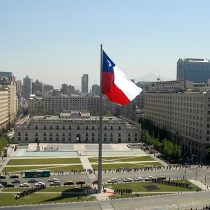
Those who adhere to social democracy in Chile have a serious problem of definitions. They are caught up in the dissonance between an imaginary of social democracy in the developed world, and the Chilean reality of progressive governments that have never managed to consolidate a welfare regime that resembles social democracy. But the problem goes even beyond the Social Democrats, because in different political sectors there are those who may be attracted to ideas of this political current. The policies implemented by social democracy are so broad that they can be even in politically opposed sectors depending on the context. Today, with a favourable world stage for these ideas, the question is whether the Social Democrats will dare to think about social democracy into the future or become entrenched in the past.
Let’s start with some conceptual clarifications. In its theoretical dimension, social democracy corresponds to the synthesis between socialism and liberalism, in terms of its vindication of the demands of wage workers and adherence to representative democracy as a regime for achieving political ends. As a result, social democracy has contributed greatly to the consolidation of the “welfare state” model or welfare regimes, which are nothing more than conciliation between the world of capital and labour through the state, to ensure universal social rights and a more equitable distribution of wealth within a capitalist system. This “welfare capitalism” was consolidated between the 1940s and 1970s in Europe and the United States, and since the 1980s has undergone various transformations with the future of economic crises and the onslations of neoliberalism. However, it remains a fundamental pillar of developed societies, their resilience points out that the so-called “welfare state crisis” is rather a transitional adaptation depending on the type of economic crisis and the alternatives available. Here the Scandinavian and German welfare regimes stand out, for their scope and sustained development, as the models that come closer to the Social Democratic ideal, but even these models, today require to be rethinked; the substantive debate is how and in what sense.
The truth is that social democracy has had a late ideological implementation on the Chilean left and although there have been governments with social democratic orientations, the existence of an effective welfare regime, even in its most liberal versions, has been nothing more than a frustrated yearning in the face of the hegemony of neoliberal ideas.
The rise of social democracy in Chile came with the government of Ricardo Lagos, who wanted to assimilate to European social democracy, but without building from Chile a clear alternative proposal to the neoliberal wave that had welfare regimes on its knees in Europe. Rather, he tried to join the “Third Way” of British Labour by Tony Blair, one of the most liberal and most criticized versions of social democracy, compared to other continental models that to this day remain in force. Despite the many successes of his government, Lagos was far from having results close to a social democratic regime, even in various aspects of social rights, neoliberalism was strengthened. For their part, Bachelet’s governments intended to build a more comprehensive social protection system and de-market social rights, but the results also do not come close to any effective welfare regime and problems are in sight. On the other hand, if the representative in her first term had some intention of approaching social democracy as a Latin American benchmark, in her second government she showed no such intention. Perhaps the alliance with the Communists could have made her give up so as not to strain the coalition any more than it already was.
However, the problem is that the discussion about Chilean social democracy becomes a debate about “laguism,” “bacheletism” and, at best, defending the idea of moderate government. Thus, an interesting political problem drowns in a tag game of brutal reductionism, which evades substantive debate and prevents progress. Let us agree that policies implemented in social democratic countries are a reference today even for communists and frontamplists, and on the other hand, there are few conservatives and neoliberals like Lavín, who see more developed social policies necessary to prevent a collapse greater capitalist economic system. If everyone resorts in any way to social democracy, it means that it is necessary to go one step further and progressives cannot stay in the old models.
Until very recently in Chile there are those who have left social democracy dead and today they are resurrecting it in the face of a situation that could be more favorable. It is unclear whether we are talking about resurrecting the Chilean social democratic imaginaries of previous governments or whether there really is a space to talk seriously about social democracy and its evolution. If we optimistically assume that there is a space to think from Chile for social democracy into the future, we must collect the problems that it has at the global level, starting, according to our initial definition, of the problems facing socialism and liberalism today, to produce a new synthesis from there.
There are many edges that we could approach, but I will refer to three that I find crucial to rethinking social democracy. The first relates to the legacy of socialism in terms of its relationship with the state. If the state was the preferred way of socialism to solve the problems of inequality by installing a universal social rights regime, society’s growing needs cannot be indefinitely assured by the state, but the market has not shown effectiveness in doing so either. The notion of a welfare state needs to be extended to a “welfare community” that includes the self-management and cooperation capacities of communities in their environment to solve their problems. The State must cede and foster spaces for the community, not the world of finance as the concept of “welfare society” has been understood since neoliberalism. Second, liberal democracies cannot remain focused on the same form of representative democracy where parties dominate, there must be more spaces for civil society. We have already referred to this in other columns, but if we consider that social democracy is typical of the era of party dominance in politics, now it is time for it to turn to civil society, this means not only towards social movements, but rather to the spaces of the common citizen, strengthening deliberative democracy to recompose the link between politics and society. Third, one point that puts both socialism and liberalism in check is the climate problem, which forces us to redefine our way of life, even from the very conception of the human being. The modernity that produced socialism and liberalism established a strong division between human beings and nature and today it is necessary to rethink our material and intangible needs on a new biosocial scale. The climate crisis we face forces us to emerge from the formulas of the twentieth century to solve social problems under the lens of more radical sustainability, which drastically affects the concept of consumer society.
Here are some ideas for rethinking social democracy for the future, but there is a great question and dilemma for social democrats in societies that have not yet conquered the social lows of the twentieth century. Sustaining the idea of social democracy anchored in the formulas of the past may today even be the way out to save neoliberalism by maintaining social services commodified with state subsidies. Unsurprisingly, conservative sectors are now defending a kind of social democracy from the past so as not to lose their hunting ground by negotiating now the social lows they previously refused to accept. Progressives cannot fall into this game and must think of another social democracy, another synthesis of socialism and liberalism, more in line with our current problems.
The content poured into this opinion column is the sole responsibility of its author, and does not necessarily reflect the editorial line or position of El Mostrador.





